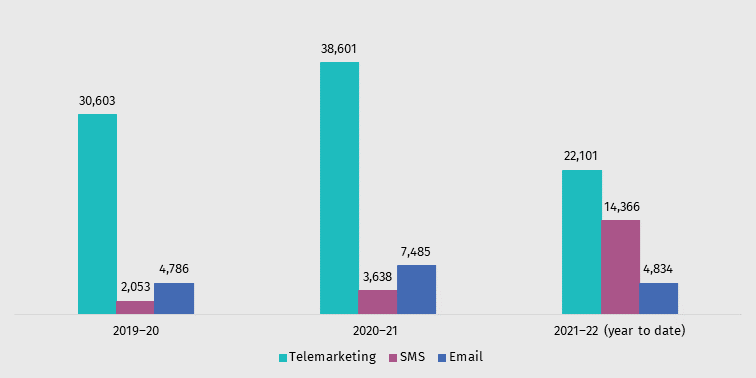|
Our key actions |
|
|---|---|
|
|
Sportsbet paid $3.7 million in penalties and refunds for spam breaches |
|
|
Over half a billion scam calls blocked by telcos under the Reducing Scam Calls rules |
|
|
We made new ID check rules to prevent scammers targeting customer interactions with telcos, including SIM swap and billing enquiries |
Our priorities
Unlawful financial service marketing and phone scams are an ACMA focus in 2021-22.
View our current compliance priorities.
Unlawful financial services marketing
We are currently seeing a downward trend in complaints to the ACMA about financial services marketing. We are actively monitoring this trend. During the quarter we:
- announced a $26,640 penalty for a business, and accepted court-enforceable undertakings from 5 businesses for unlawful spam and/or telemarketing
- finalised 2 investigations
- alerted 73 businesses about potential compliance outcomes.
Combating phone scams
We are taking the fight to scammers to disrupt their activities and protect Australians. During the quarter we:
- reported that 549 million scam calls were blocked by telcos under the Reducing Scam Calls rules from 2 December 2020 to 31 March 2022. We provided de-identified complaint data to telcos to help them identify these calls
- made new rules to help prevent scammers from targeting high-risk customer interactions with telcos, such as SIM swap requests and billing enquiries
- published the Unsolicited Communications in Australia: Consumer experience 2021 research report, exploring the incidence, type, impact and management of unsolicited communications, including scams
- warned consumers about scammers sending parcel delivery SMS and email messages with unusual looking links or requests to pay a fee to complete delivery
- worked behind the scenes with telcos, government agencies and other trusted brands to disrupt phone scams.
Find out more about how to protect yourself from phone scams.
Key compliance issue: Victorian Energy Upgrade telemarketing
We have observed a recent spike in complaints about telemarketing calls related to the Victorian Energy Upgrades (VEU) program. These complaints suggest calls may be being made in breach of several telemarketing laws, including:
- calls being made to numbers on the Do Not Call Register
- callers failing to identify themselves or the business they are calling on behalf of at the start of calls
- calls not being terminated when requested by the consumer.
It appears some of these calls are being made by lead generation businesses either directly on behalf of accredited providers under the VEU program, or to generate marketing lists to on-sell to accredited providers.
Businesses cannot outsource their obligations under Australia’s telemarketing laws via commercial arrangements. If a third-party is making calls on a business’s behalf, or if a business has purchased marketing lists from a third party, it is the business’s responsibility to ensure it is compliant with the laws.
Some key points:
- Even if someone else is making telemarketing calls on a business’s behalf, the business must still have permission from each person contacted and be able to provide evidence of this permission if asked by the ACMA.
- When buying marketing lists, businesses need to take care. They are responsible for making sure they have permission for any phone numbers called on the Do Not Call Register. Simply relying on a statement from a supplier or lead generator is not enough. Businesses must also be able to provide evidence of consent if asked by the ACMA.
- Businesses and call centres must identify themselves at the start of calls, and calls must be terminated upon request by a recipient.
We are actively monitoring this issue and may formally investigate if ongoing non-compliance is suspected.
The Victorian Essential Services Commission has also advised that it is timely for accredited providers in the VEU program to review their compliance with telemarketing legislation now, ahead of the VEU Code of Conduct coming into force on 1 July 2022.
Find out more about how to avoid breaching the telemarketing rules.
Investigations and enforcement
We finalised 4 investigations and commenced 2 in the quarter. We had 2 investigations underway at the end of the quarter.
Investigations took 4.4 months on average to complete.
We also actively monitored compliance with 17 court-enforceable commitments setting out actions businesses must take to comply with spam and/or telemarketing laws.
View our enforcement actions for breaches of spam and telemarketing laws.
Find out more about our compliance and enforcement role and the penalties for breaking the rules.
Finalised investigations

Complaints
Consumer complaints directly inform our actions and help us identify issues and trends. We also provide de-identified complaint data to telcos to help them identify and block scam calls.
- 18% of telemarketing and 38% of spam complaints were about scams.
- The most common complaints were about financial services, retail and the building/ maintenance sectors.
- 40% of complaints about telemarketing did not contain enough detail to identify the caller. Giving us as much information as possible helps us to stop non-compliance (This figure was originally published as 44% and has now been corrected).

Note: We have also received 57 complaints about commercial instant messages in the year to date
Compliance alerts
We alert businesses about potential compliance issues raised in complaints where we can. We provide details to the business when the complainant has given us permission. If the issues continue, we may investigate. One alert can relate to several issues or complaints.

More information
Find out more about spam and telemarketing rules and what actions you can take, including making a complaint.
Subscribe to our newsletters to get updates about our actions on telemarketing, spam and scams.
Access the data
Download the data for the charts in this report:


